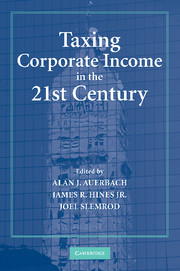Book contents
- Frontmatter
- Contents
- Contributors
- Preface
- 1 The Effects of Taxes on Market Responses to Dividend Announcements and Payments: What Can We Learn from the 2003 Dividend Tax Cut?
- Comments
- Comments
- 2 Dissecting Dividend Decisions: Some Clues about the Effects of Dividend Taxation from Recent UK Reforms
- Comments
- Comments
- 3 The 2003 Dividend Tax Cuts and the Value of the Firm: An Event Study
- Comments
- Comments
- 4 How Elastic Is the Corporate Income Tax Base?
- Comments
- Comments
- 5 An Empirical Examination of Corporate Tax Noncompliance
- Comments
- Comments
- 6 On the Extent, Growth, and Efficiency Consequences of State Business Tax Planning
- Comments
- Comments
- 7 Corporate Taxation and International Competition
- Comments
- Comments
- 8 The Changing Role of Auditors in Corporate Tax Planning
- Comments
- Comments
- 9 Taxation and the Evolution of Aggregate Corporate Ownership Concentration
- Comments
- Comments
- Index
- References
3 - The 2003 Dividend Tax Cuts and the Value of the Firm: An Event Study
Published online by Cambridge University Press: 30 July 2009
- Frontmatter
- Contents
- Contributors
- Preface
- 1 The Effects of Taxes on Market Responses to Dividend Announcements and Payments: What Can We Learn from the 2003 Dividend Tax Cut?
- Comments
- Comments
- 2 Dissecting Dividend Decisions: Some Clues about the Effects of Dividend Taxation from Recent UK Reforms
- Comments
- Comments
- 3 The 2003 Dividend Tax Cuts and the Value of the Firm: An Event Study
- Comments
- Comments
- 4 How Elastic Is the Corporate Income Tax Base?
- Comments
- Comments
- 5 An Empirical Examination of Corporate Tax Noncompliance
- Comments
- Comments
- 6 On the Extent, Growth, and Efficiency Consequences of State Business Tax Planning
- Comments
- Comments
- 7 Corporate Taxation and International Competition
- Comments
- Comments
- 8 The Changing Role of Auditors in Corporate Tax Planning
- Comments
- Comments
- 9 Taxation and the Evolution of Aggregate Corporate Ownership Concentration
- Comments
- Comments
- Index
- References
Summary
Introduction
On June 20th, 2003, President Bush signed the JGTRA03 into law. This act contained a number of significant tax provisions, but the most noteworthy may have been the changes in the dividend and capital gains tax rates. The top capital gains rate of 20 percent was reduced to 15 percent. The top rate on dividend income was reduced from the highest statutory income tax rate of 35 percent to 15 percent. Capital gains and dividend tax rates for low-income individuals were reduced to 5 percent, dropping to 0 in 2008.
The likely impact of these tax changes on economic activity has been explored in some detail. A key consideration in this analysis is the marginal source of finance for firms that pay dividends. Under the “new view” of dividend taxation developed in Auerbach (1979), Bradford (1981), and King (1977), the marginal source of finance for new investment projects is retained earnings. In this case, the tax advantage of retentions precisely offsets the double taxation of subsequent dividends: Taxes on dividends have no impact on the investment incentives of firms using retentions as a marginal source of funds and paying dividends with residual cash flows. Alternatively, the dividend tax affects the marginal source of finance under the “traditional view,” where firms rely on new share issuance as the marginal source of funds.
To date, there has been a significant debate concerning the relative importance of the new and traditional views of dividend taxation.
- Type
- Chapter
- Information
- Taxing Corporate Income in the 21st Century , pp. 93 - 126Publisher: Cambridge University PressPrint publication year: 2007
References
- 22
- Cited by



